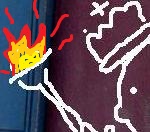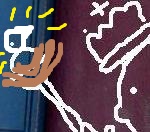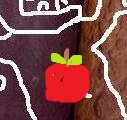Some disclosures: Have met the poet once briefly, spoken a few times on social media. Review copy provided by Penned in the Margins. I requested and received a text copy of the essay “The Songs of Hecate: Poetry and the Language of the Occult”, published by The White Review, from Tamás in the process of researching this piece. A heads up for those who need it: the book thoughtfully and carefully critiques violence against women, particularly in a political context – Tamás has discussed in an interview her wish to prevent such scenes from becoming ‘spectacles of women’s pain’. Deepest thanks, as ever, to Muireann Crowley for editing this review.
Review: It’s difficult to know where to start in discussing Rebecca Tamás’ first full-length collection, WITCH. The poems incorporate a huge amount of visual and aural information: in terms of discussing recurring themes (physical pleasure, solidarity between women, fluidity of identity, understanding the past to imagine the future, the sanctity of living, and some non-living, things) and images (dirt/silt/mulch, ash, trees, neon, honey, the colour blue), there is simply too much for any single review to cover. Arguably this is the ideal situation for such a many-minded, open-hearted book.
WITCH spends much of its time following its eponymous character, an immortal being witnessing, on a near-geological scale, the warp and weft of human history. The book playfully casts its ideal reader/listener in one of the few mortal characters in the book, the ‘petrol station boy’ who appears in ‘WITCH EUROPE’ and ‘WITCH AFTER’. He seems genuinely enthusiastic to hear what the witch has to say, and ‘shares a cigarette with her / under the no smoking sign which is his way of saying / I don’t know what to be sorry for but I am sorry’: the witch reserves her stories for those willing to do the work of careful listening. WITCH is precise and agile in its tonal and syntactical shifts: there are many occasions in which it feels like a poem is on the verge of hyperbole, of drifting away from its solid emotional core, but re-centres itself immediately with some casual turn of phrase that takes the breath away. For an example, here’s a short passage from ‘WITCH AND THE SUFFRAGETTES’, noting the gear-change into the last line:
‘the witch wonders what happiness could possibly look like
at some point it went wrong and even though she’s very old
she doesn’t know exactly when that point was
but she’s thinking that the most likely is probably Orpheus
when Orpheus was singing it was so marvellous and Eurydice sang too
obviously they were a great couple’
Earlier, the poem locates the forced feeding of the suffragettes in a history of punitive measures against women, like the scold’s bridle. Here, space is made for a moment that almost dismissively punctures the gravity and distance of both history and myth, one which allows that deflation to bring home the poem’s drama. It continues:
‘Orpheus went back to get Eurydice from death as we know
but he wouldn’t let her make her own way out of the rubble seek into the scratch of
each step that is not knowing always not knowing […]
her song is still down there somewhere’
One of the great strengths of WITCH is its instinct for when to be explicit (that is, make an uncomfortable truth unignorable) and when to trust the reader’s engagement. In the myth, Eurydice is a treasure to be won and lost by Orpheus, here she is a person. It’s a simple change, but one that reorients the entire scene: the poem draws out echoes between Orpheus and the prison guards, who both fatally considered their charges incapable of self-determination. The poem explores how political change rarely comes with ‘lots of clear light pouring in gold fantastic gold’, more often with undignified physical suffering, that ‘the smell of freedom is the smell of vomit’. The final image is one of visionary anger, the witch conjuring a scene that sustains her mind when her body is made abject:
‘all the fires coursing up the townhouses […]
were all already there cracking and flailing
and spitting
the pleasure of seeing everyone see it
their white eyes fat with flames
it is all burning it has all been burning us’
* * *
‘WITCH MARS’, ‘WITCH EARTH’ and ‘WITCH VOLCANO’, meanwhile, are characterised by weariness and a wish for escape. Often this manifests formally, as the propulsive lines seen elsewhere waver and halt, becoming structurally simpler than the rest of the collection:
‘mars is just lovely […]
witch says to herself that no one has ever been hurt here […]
no one has corrupted mystics still pure and flashing like neon signs’ (‘WITCH MARS’)
‘what the earth deserves
so much
so much more
than dead bodies […]
the earth likes wolves at least
you can give it wolves
you can give it
that’ (‘WITCH EARTH’)
‘Witch lies on the volcano
amongst creeping language […]
the witch has too many reasons to part from the earth but she won’t part […]
she cannot go home from the world’ (‘WITCH VOLCANO’)
In each of these instances – as in ‘WITCH AND THE SUFFRAGETTES’ – a moment of profound sadness is countered, however forlornly, by imaginative force. In ‘WITCH VOLCANO’, the witch seems to recover her strength, or at least starts moving again, after watching a congregation of ghosts in what feels like a communal ritual of healing:
‘ghosts are pink and blue and gold agile birds
they are safe when they can change
safe when they can mourn and have voice to mourn
safe when they can hurt safe and entirely shattering
all of them crowding up into each other’s skinny arms
transparent clever yearning bodies and eyes […]
the witch watches the charged belonging air
rubs her foot in the salt lava
intimate and hot as god’
The ghosts manifest as an emblem of ideal community: their ghostliness allows them to present their ‘organs pulsing and held out like gifts’ to each other, a surreal enactment of one of the book’s key principles, the relative paucity of hard boundaries between one self and another. (This is grimly echoed in ‘WITCH FIRE’, as the deathless witch’s body disintegrates into many others at the stake.) As Tamás notes in an interview with Alice Hiller, the book celebrates ‘being amorphous, open’, and that ‘The witch doesn’t really believe in gender. […] Witch is male. Witch is female.’
While this mode of thought – disdainful toward taxonomy, faithful to mess – informs much of the book’s communitarianism, anti-facism and socialism, it might be worth hovering around gender a second longer. In her essay in The White Review, “The Songs of Hecate: Poetry and the Language of the Occult”, Tamás talks about Silvia Federici’s landmark study, Caliban and the Witch, which examines how the category ‘witch’ is delineated and propagated by early colonialist European states as a pretext for wiping out generations of women’s social power and shared knowledge in the witch hunts of 1580-1630. Prior to this, the ‘devil’ was a capable, if easily defeated, trickster in most European folklore; during the witch hunts he was co-opted as an inversion of social norms, playing strongly on stories of him offering sexual and social freedoms outwith the authority of husband and state. In WITCH the devil explicitly exhibits genderfluidity through his ability to shapeshift, an embodied freedom from binaries, in a way that harmonises with the book’s opposition to political strictures.
Tamás is an excellent storyteller, WITCH accommodates an impressive amount of emotional and scholarly information, and it is absolutely possible to relish the messy, intimate, glorious relationship the witch and the devil enjoy without considering any of the above. When placed in their literary-historical context, however, as representatives of those excluded and punished in the name of social cohesion, the layers of meaning and possibility that constitute ‘WITCH AND THE DEVIL’ begin to become apparent. There’s too much of it to quote satisfactorily, but here’s a taste:
‘when the witch first met the devil the devil was
a beautiful man and a beautiful woman
the devil had long eyelashes and a body that was hard and soft
at the same time so that you wanted to hold him
and also be held by her […]
the devil liked getting up early which is what the witch liked so they would go out
before anyone else was around and they would act out satanic rituals in the woods […]
and also the light had the green tint of rusted copper and took part in the celebrations […]
the witch didn’t just feel like she was getting what she wanted she felt like everyone
everywhere was getting what they wanted’
The specifics of their relationship are, like much of the witch’s life, marked by hyperreality: one could easily read blood sacrifices as a spooky proxy for long walks on the beach. The early parts of the poem run away with themselves rhythmically, absent of decelerative punctuation, and the descriptions of their sex life – ‘the devil had all the sexual organs you could / want’ – exhibit perhaps the richest blend of earnest joy, comedy by exaggeration, and thematic seriousness in the whole book. A real treasure is the poem’s treatment of the witch and devil’s breakup (if that’s what’s meant by goodbye), a mature and loving conversation:
‘when the witch said goodbye to the devil
they didn’t get overtly emotional but they held onto each other
for a long time until there was a flow of breath back and forth
that was entirely equal in the air passing through their mouths’
I can’t recall many poems that not only explore sexual/romantic relationships as loci of nuanced mutuality and regard the end of said relationship not as failure, but change, but also extrapolate that thread into its broader political thinking. As the devil notes in an intimate moment: ‘you had to make a decision are you prepared to destroy yourself / for freedom even though it will be really awful and maybe worse than not freedom’. The lovers’ sensitivity and, unlike Orpheus, willingness to let go at the right time, informs and is informed by their attitudes to the world at large.
* * *
Alongside the witch poems are twenty-one spells. In Tarot, the twenty-first Major Arcana is The World, associated with the completion of a cycle or fulfilment of what is willed, and often represented by a figure both male and female, heavenly and mundane. This feels like too much of a coincidence not to be intentional. It may be that the spells are intended to be read like tarot cards, a suggestive space for self-reflection that does not require or even encourage a conclusive answer. Though the witch poems often abide by obscure logic, they are identifiably in the process of forming a narrative or argument; the spell poems feel like momentary embodiments of the moods of those poems, their rational scaffolding forgone. ‘spell for joy’ begins:
‘THESUN THESUN THESUN
nothing can be trusted!
raise up your rinsed hands!
terrible fury and becoming!
take off your clothes!’
The poem seems more interested in the visceral effect of reading these words than in their logical force as conjoined thoughts, in this case the idea that ‘joy’ as an experience is also a kind of recklessness, a conscious rejection of security and stability. These could be read as speech acts by the witch herself, a shift from third to first person and an outlet from the boundaries of being narrativized. Although a very different experience to the acts of readerly empathy required in the witch poems, the experience of digesting:
‘I see a shaking which is total and absolute fear
one day yr gonna die!
the hot impossible apple of
your perfection’
is a little unsettling, but has a weird carefulness to it, a camaraderie, and there is unmistakable love in those last lines. I keep hearing ‘one day yr gonna die!’ while going about my business over the past few days, a chipper, ominous earworm.
This positive estrangement is perhaps most powerfully articulated in ‘spell for reality’, a poem that stands out among the spells for its calm and thoughtful pacing, the relatively clear provocation in the first lines, ‘what do you do when the answer to / too much is absolutely nothing?’ The poem carries echoes of MacNeice’s ‘Snow’, which Tamás studies in her White Review essay, in its worrying around the edges of perception, of accepting that the ‘more’ between MacNeice’s ‘snow and huge roses’ might be ultimately unsayable, but no less real for it. ‘spell for reality’ continues:
‘sometimes the ashy body in the ground seems
to have all the answers
ultimate realness nasty truth as the final only truth
why then this stupid relentless yearning for snow
why the honey and talking’
What Tamás and MacNeice seem to agree upon is that human beings are, finally, as subject to the whims of nature as any other creature. By exploring these fundamental questions about the nature and sanctity of living things, their inscrutable yearnings, the fire and the honey, they also recognise that there is something more to it than meets the eye, and that wondering about what that more might be is a fine way to spend what life we have.
* * *
WITCH feels like the right book at the right time. It’s a book that valorises political literacy, and figures its own feminist and socialist beliefs as inextricable from its aesthetics. What comes across most clearly is that this collection is, at heart, a gift. The witch is constantly mindful of who might need her strength, who might need her understanding, who deserves either or both. Tamás and Sarah Shin’s anthology, Spells: 21st-Century Occult Poetry, demonstrated the appetite for an approach to ritual, spirituality, and philosophical inquiry. It is clear that ‘witch’ means a great many different things to a great many different people, and WITCH opens those possibilities ever further.
Further reading: Rebecca Tamás – “The Songs of Hecate: Poetry and Occult Language”, The White Review
Alice Hiller – “I Wanted to Think About the Possibility of a Revolution Based on Female Principles: Interview with Rebecca Tamás”
Rebecca Tamás – “The Enchantment of Disenchantment: Wallace Stevens’ ‘Sunday Morning’ & Ecopoetic Potential”, Wild Court
Patricia Ferguson – “Filth and Glory: Review of WITCH by Rebecca Tamás”, EcoTheo Review
Silvia Federici – Caliban and the Witch: The Body and Primitive Accumulation (Autonomedia)
Sarah Shin & Rebecca Tamás, eds. – Spells: 21st-Century Occult Poetry (Ignota Press)
Katie West & Jasmine Elliott, eds. – Becoming Dangerous: Witchy Femmes, Queer Conjurers, and Magical Rebels (Fiction & Feeling)




